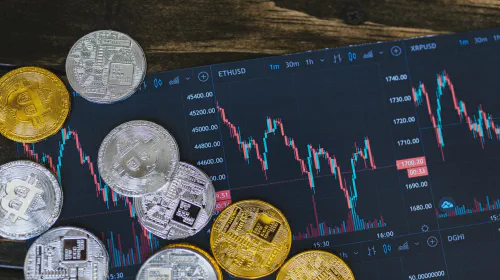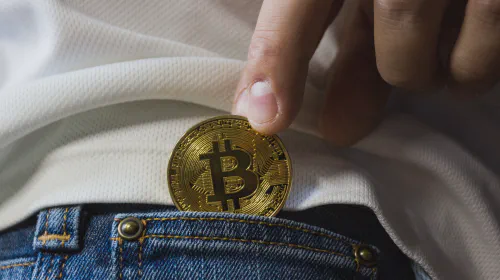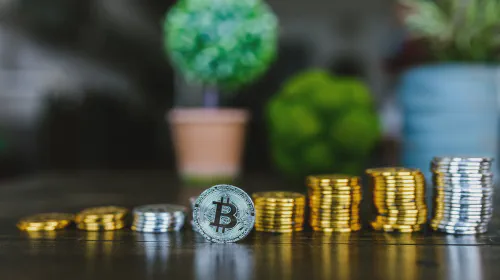Difference Between Ethereum and Ether Explained
Salomon Kisters
Sep 30, 2022This post may contain affiliate links. If you use these links to buy something we may earn a commission. Thanks!
No. Strictly speaking, Ethereum and Ether are not the same. Ethereum refers to the blockchain network that supports Ether and all other Ethereum-based tokens, while Ether is the main token on Ethereum.
People who are somewhat familiar with cryptocurrency have probably heard about Ethereum and Ether. Due to their similar names, people often confuse the two and think that they are the same thing. This information couldn’t be further from the truth, and, to clarify this common error, this article will discuss what Ethereum and Ether are and how they are different from each other.
Key Points under Focus
Ethereum is a blockchain-based platform that replaces online third parties who store and sell personal user data for profit. In an idealized Ethereum network, no single entity would hold user-sensitive data, making it less subjective to hacks or shutdowns and a potentially good investment for cryptocurrency enthusiasts. To offset the cost of performing transactions on Ethereum, you will need Ether to make this payment.
Things are looking up for the users of this blockchain since it has shifted from Proof-of-Work (PoW) to Proof-of-Stake (PoS), a consensus algorithm that requires fewer resources and expensive hardware. Because it requires significantly less computing power and resources, this transition has enabled Ethereum to increase its efficiency against newer cryptocurrencies that use this consensus mechanism.
Things to Know About Ether
Despite Ethereum having a team of hardworking developers behind it, no one particularly owns the blockchain, and all of the network-connected apps and services need something to pay for using this platform to power their transactions. So, if Ethereum isn’t owned by anyone and using it isn’t free, how do the users pay for the services?
Transactions on crypto blockchains are not processed or approved by a third party and can’t be paid with a normal currency that we are familiar with. This is where Ether comes in, a virtual token popularly known as the Ethereum network’s cryptocurrency. Think of Ether as fuel for the decentralized Ethereum network’s applications and smart contracts.
Assume there is an Ethereum blockchain application that enables you to make, alter, and remove basic notes, which requires network computing power to execute these operations. To compensate for the expense of this function, you will need to pay a small price if you want to make changes to your current notes and the token that people use to make this payment on Ethereum is Ether.
It functions like digital fuel in the sense that it permits the network to integrate the modifications you’ve made. Since Ether is a form of fuel, it stands to reason that transaction costs would vary based on how much fuel is necessary for the service rendered.
Things to Know About Ethereum
Before we get into what makes Ethereum distinctive, let’s go over some fundamental blockchain principles. All of your personal information is stored on clouds created on online servers controlled by large providers such as Google and Facebook. These organizations provide low-cost data storage and retrieval while avoiding the hassles of hosting and uptime.
However, storing personal data on someone else’s computer exposes it to hacking or other forms of intrusion. This is the foundation of what is known as the centralized internet, which connects people in a variety of ways.
Blockchain technology, a type of decentralized internet, has split from the main controlled internet to give improved privacy and security to all the users. And Ethereum is part of the trend with even more enhanced privacy and security. The crypto blockchain replaces online third parties who are interested in your personal data and use it for their own gains.
To completely remove the system of cloud and individual servers controlled by monopolies, Ethereum relies on nodes run and managed by volunteers. In a hypothetical Ethereum architecture, no one organization would manage your personal data, making it significantly less susceptible to hacks or shutdowns.
Along with decentralizing server and hosting functions, Ethereum offers a new kind of application known as a dApp. These apps function similarly to the wider Ethereum network since they are decentralized and rely on Ethereum’s global network of nodes to function and stay connected.
Another notable feature Ethereum offers are smart contracts. Smart contracts on Ethereum blockchain networks support self-executing code that can be used to build different types of applications. To execute a smart contract, Ethereum miners must first download and execute the smart contract code on their computer network. After the computer network has processed the transaction, the Ethereum network pays miners in ETH as a reward for their efforts. This means that if you want to process a smart contract on the Ethereum network, you must pay miners in ETH to do so.
Furthermore, with Ethereum, users have full access to Decentralized Finance [DeFi]. DeFi refers to financial services provided on public blockchains, especially Ethereum, that you can use to earn interest, borrow, lend, purchase insurance, trade derivatives, exchange assets, and more, but more quickly and without requiring any paperwork or a third party like banks. DeFi, like crypto in general, is a worldwide, peer-to-peer infrastructure, meaning it directs the transaction between two individuals rather than being routed via a centralized system.
Ether and Other Cryptocurrencies
Each activity performed on Ethereum blockchain or decentralized software requires a unique amount of processing power and time. The higher the Ether charged for completing the activity, the more the power and time needed, which is one of the main differences between Ether and Bitcoin.
Another notable difference is that many digital currencies have hard limits or maximum amounts of digital tokens that may be mined. However, there are no boundaries with Ether, which is why users mine almost 18 million Ether every year. Sixty million Ether were purchased by consumers in a 2014 crowdfunding effort, with the remaining 12 million going to the Ethereum Foundation, a group of engineers and analysts working to improve the Ethereum blockchain technology.
Miners get five ETH or five Ether tokens for verifying network transactions every 12 seconds. Despite its distinctions, the ETH market behaves in many ways that are similar to other current digital currencies like Bitcoin.
Ether vs. Ethereum
The difference between Ether and Ethereum is that Ether is used to process all user transactions on the Ethereum blockchain, while Ethereum is the platform where Ether is spent. As explained before, Ether is simply a payment solution that Ethereum uses for network-connected applications and services that require processing power.
Should You Invest in Ether in 2022?
This question is quite difficult to answer. The experts on the matter claim that it is nearly impossible to predict the future of Ethereum with absolute certainty.
Even when there weren’t any major changes being introduced to the blockchain, big platforms made many mistakes in predicting the closing value of Ether. Some analysts predict that the price of ETH will be even more unpredictable, owing to Ethereum’s move to a less energy-intensive version known informally as “The Merge.” Ethereum’s update might make it more enticing and sustainable for mass usage, but experts are waiting to see how investors and firms working on the Ethereum platform react to the improvements.
Ethereum switched from PoW to PoS consensus mechanism recently, which means we have yet to see if this shift brings a positive or a negative impact on the prices of Ether. Ether’s price might fall to as low as $500 this year in another major plunge. Wendy O, a crypto market expert, predicts that ETH will fall by up to 85% after experiencing the all-time high of $4,800, bringing it down to roughly $750. According to venture entrepreneur Kavita Gupta, ETH prices can drop down to $500 if the larger market sell-off continues.
Regardless of what happens in the near future, investors will want to see an improved demand and functionality for the price of Ether to rise in the long run. While the Ethereum team continues to migrate to second-generation upgrades, the blockchain now faces significant competition from comparable crypto blockchains that are doing an excellent job of filling the gaps. If Ethereum does not take the appropriate actions quickly and overcomes the things it lacks, it might lose the dominance it holds over the world of cryptocurrency in a year or two.
Summary
The blockchain technology that has supported the majority of cryptocurrencies over the past few years is, undoubtedly, Ethereum. Ethereum has been instrumental in leveraging blockchain development, supporting the execution of smart contracts, and enabling Decentralized Finance and Decentralized Applications.
Ether is the token of the Ethereum blockchain network. As the ultimate solution to the issues of payment in the traditional financial system, Ether facilitates all kinds of operations on the Ethereum network. It is not only the second largest cryptocurrency after Bitcoin. It is poised to become the global digital money in digital financial transactions and the currency of choice for DeFi and dAp
Stay informed with the latest insights in Crypto, Blockchain, and Cyber-Security! Subscribe to our newsletter now to receive exclusive updates, expert analyses, and current developments directly to your inbox. Don't miss the opportunity to expand your knowledge and stay up-to-date.
Love what you're reading? Subscribe for top stories in Crypto, Blockchain, and Cyber-Security. Stay informed with exclusive updates.
Please note that the Content may have been generated with the Help of AI. The editorial content of OriginStamp AG does not constitute a recommendation for investment or purchase advice. In principle, an investment can also lead to a total loss. Therefore, please seek advice before making an investment decision.

Can Algorand Be Like Ethereum, and Does It Have a Future?
Today, we will be closely looking at how Agorand compares with Ethereum and whether this new, emerging cryptocurrency has a prosperous future or not.

Ethereum vs. Cardano - What's the Difference?
Those who are well versed in the world of cryptocurrency undoubtedly know about the Cardano vs. Ethereum debate. Let's explore.

Ethereum vs. Dogecoin - What's the Difference?
This article will explain what makes Ethereum and Dogecoin unique and how they compare with each other.
Protect your documents
Your gateway to unforgeable data. Imprint the authenticity of your information with our blockchain timestamp